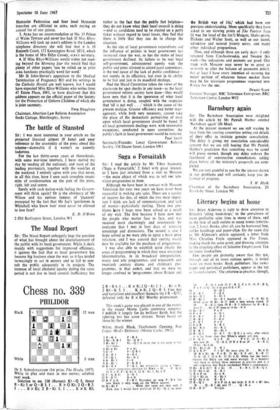The Maud Report
Sir: The Maud Report unhappily begs the question of what has brought about the disenchantment of the public with its local government. While it deals mainly with suggestions for improved efficiency, it ignores the fact that as local government has become big business since the war, so it has tended increasingly to act in secrecy and to fail to con- sult the public adequately in its projects. The increase of local electoral apathy during the same period is not due to local council inefficiency but
rather to the fact that the public feel helpless— they do not know what their local council is doing
—and as candidates tend to be elected on a party ticket without regard to local issues, they feel that there is little that they can do to change the situation.
As the size of local government expenditure and the influence of politics in local government has increased since the war, so has the status of local government declined. Its failure to be real local self-government, administered openly with the public and press allowed to attend most committees. is the real cause of the lack of public confidence— not merely in its efficiency, but even in its ability to be fair and just in its manifold dealings.
Had the Maud Committee taken the views of the electorate by spot checks in any town—as the local government reform society have done—they would have seen that it is the ignorance of what local government is doing, coupled with the suspicion that 'all is not well . . .' which is the cause of the present malaise. Greater efficiency and better man- agement, while both very necessary, cannot take the place of the democratic partnership of trust upon which local government should be based. If all local government dealings were, with reasonable exceptions, conducted in open committer, the public's faith in local government would be restored.
Paul Smith Secretary/Founder. Local Government Reform Society. 136 Sloane Street, London SW1


































 Previous page
Previous page